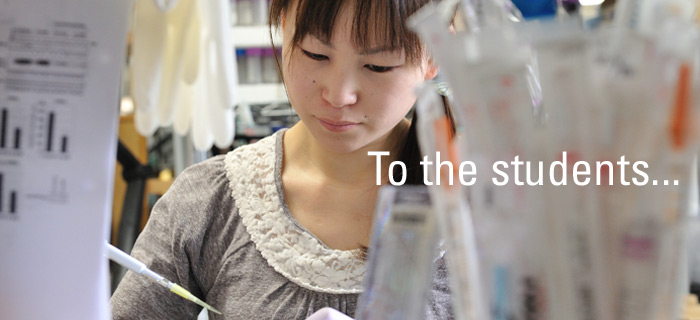Introduction
Many of the students currently enrolled in our Graduate Program in Medical Sciences have obtained their 4-year degree in the area outside medicine, including pharmacy, biology and chemistry. Such a diversity has helped to create a unique academic environment for students to confront frontline research through discussion and cooperation amongst their peers. We expect to significantly increase the number of students from abroad to further diversify our program.
In the near future we expect to significantly increase our student intake from abroad which will further add to the diversity already present within the program.
We are presently reorganizing the education system to better reflect this diversity in student backgrounds by introducing a new course system. This new system will clearly specify the goals associated with each course, the organizational structure of the course curriculum facilitating the achievement of these goals and the relevant student support systems which will assist the students in case of problems.
One of the special features of the Doctoral Program in Medical Sciences is the “Musha shugyo” system of study (samurai errantry) already started in 2005. “Musha shugyo” study is an active learning program in which the students propose assignments by themselves and complete these assignments through judicious collaboration with researchers from abroad and from industry.
The program originated from medical education reforms advocated by McMaster University in Canada and Harvard University in the United States. The program has also been adopted throughout Finland, a country noted for its innovative education system.
Previous trends in Japanese graduate school education reform have often overly focused on producing doctoral degree awardees meeting international standards in substantiveness, comprehensiveness and reliability. One noted consequence of these prior reform experiments was the production of students who suffered from one or more of the following weaknesses.
- Generally acquainted with the field but were poor in applied skills
- Unable to design and manage a research program independently
- Lack of relevant knowledge of field
- Lack of communication skills – including language skills
- Lacking a well rounded academic mind
In an effort to combat the above trends we have decided to make “Musha shugyo” active learning systems the primary focus of our research curriculum. Although we still endeavor to produce doctoral awardees meeting international standards in substantiveness, comprehensiveness and reliability we consider active learning “Musha shugyo” study as the best way to cultivate the highest quality of scientists who are truly worthy of the conferment of the Doctoral degree.
In some respects, “Musha shugyo” study may be seen as antithetical to substantiality – an educational philosophy that emphasizes learning of content set in concert with a grading policy known in advance.
In summary, we feel that “Musha shugyo” is a superior strategy for training students wishing to become the researchers of tomorrow – and this is one of the stand out features of the University of Tsukuba Doctoral Program in Medical Sciences.
